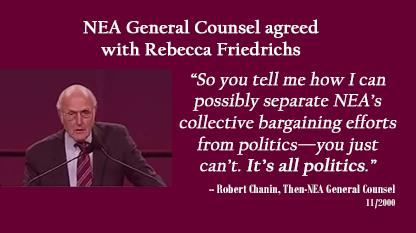Will Team Biden Weaponize Workers’ Pensions?
Big Labor abuse of worker pension and benefit funds as a means of advancing union bosses’ self-aggrandizing policy objectives is a familiar phenomenon.

In their opening paragraph, the Rebecca Friedrichs et al petition for a writ of certiorari (request for the U.S. Supreme Court to hear their case) cite two recent National Right to Work Foundation U.S. Supreme Court victories to lay the groundwork for their claim that forced government union dues is compelled political speech. And, the National Education Association (NEA) union’s former General Counsel and Lobbyist Robert Chanin in a November 2000 report in Education Week made it clear that teachers unions know Friedrichs’ claims are true:
“So you tell me how I can possibly separate NEA’s collective bargaining efforts from politics—you just can’t. It’s all politics.” (Bob Chanin, NEA General Counsel, Unions Pull Out Stops for Elections, Jeff Archer, Education Week, 11/2/00)
Petition for a writ of certiorari filed. (Response due March 2, 2015); first paragraph below:
This is a challenge to the largest regime of state compelled speech for public employees in the Nation. Each year, the State of California compels its public school teachers to make hundreds of millions of dollars in payments to Respondent California Teachers Association (“CTA”), Respondent National Education Association (“NEA”), and their local affiliates. California law makes these payments mandatory for every teacher working in an agency-shop school—which is virtually every teacher—regardless of whether that teacher opposes the positions CTA takes in collective bargaining and regardless of whether the positions CTA takes in collective bargaining are directly contrary to that teacher’s on-the-job interests. This multi-hundred-million-dollar regime of compelled political speech is irreconcilable with this Court’s recent recognition of “the critical First Amendment rights at stake” in such arrangements. Knox v. Serv. Emps. Int’l Union, 132 S. Ct. 2277, 2289 (2012). The logic and reasoning of this Court’s recent decisions have shattered the intellectual foundation of its approval of such compulsion in Abood v. Detroit Board of Education, 431 U.S. 209 (1977)—a decision that was questionable from the start, as Justice Powell argued persuasively in his separate opinion. Id. at 245 (Powell, J., concurring in the judgment) (describing the majority’s opinion as “unsupported by either precedent or reason”). The time has therefore come for this Court to reconsider that decision and, at long last, give “a First Amendment issue of this importance” the consideration it deserves. Harris v. Quinn, 134 S. Ct. 2618, 2632, 2639 (2014).

Big Labor abuse of worker pension and benefit funds as a means of advancing union bosses’ self-aggrandizing policy objectives is a familiar phenomenon.

Leaked CTU Proposals Won’t Do Anything to Improve Schools’ Poor Performance

What impact does handing a union monopoly power to deal with your employer on matters concerning your pay, benefits, and work rules have on your pay?